Plastic goods hit coir industry
By Ananda KANNANGARA
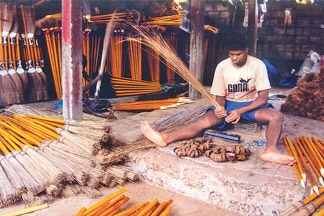 |
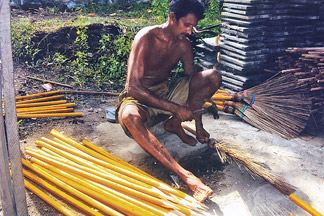 |
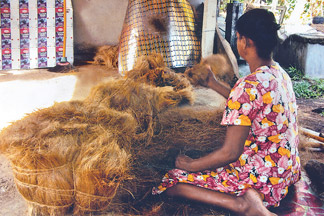 |
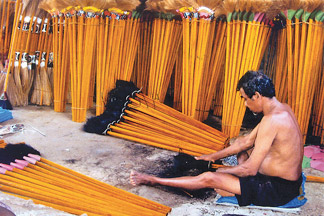 |
| Manufacturing
brooms and ekel brooms |
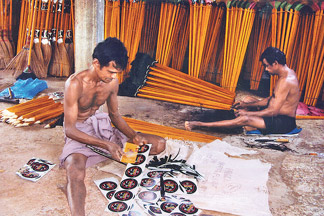 |
| Making coir
based products. |
The import of plastic brooms and brushes were eating into the fabric
of coir manufacturers and small scale manufacturers of brooms and ekel
brooms. Coir manufacturers say that there has been a drastic drop in
sales and that the Government should intervene and protect small-time
coir manufacturers.
Prison history shows that the first coir rope which was to be fixed
to the gallows in Sri Lanka, 150 years ago was brought from a
manufacturer, called Martin Singho, living in Pothupitiya in the
Kalutara District. As the quality of the local rope was not up to
standard, another rope was brought from Pakistan and this was fixed to
the gallows in 1877.
History also shows that the local hangman who was appointed by former
colonial rulers had come all the way from Kandy to this picturesque
village of Pothupitiya to buy the coir rope.
Coir manufacturers in Pothupitiya even today reminisce about the
historic coir rope which was bought by the Lankan Prison, 150 years ago
and was a product of Pothupitiya.
The book titled `Coir industry Down South' reveals that people in the
village of Pothupitiya had been engaged in the coir industry even before
the colonial era.
Ancient kings had supported coir industrialists.
According to statistics, the coir industry is carried out in the
coastal areas of the Kalutara District.
The livelihood of about 400 families in Kalutara, Beruwala, Matugama,
Pothupitiya, Waskaduwa and Wadduwa areas are manufacturing coir-related
products.
Statistics also reveal that over 3,000 people living in these areas
depend on the coir industry.
We visited coir industrialists in Beruwala, Pothupitiya and Wadduwa
to see the development of the industry and also to inquire about the
grievances faced by them.
A long standing coir industrialist, 57-year-old Upali Karunaratna of
Pothupitiya said over 300 families in the village were engaged in the
coir industry and earn a sufficient monthly income.
He said about 3,000 people in the village and in the surrounding
areas depend on the coir goods manufacturing industry and unlike in the
past, many people now used brooms and brushes made of synthetic
material.
"This was a big blow to coir industrialists. The Government should
control the import of synthetic items, so that the coir industry could
survive and develop,".
Upali said he has been in the coir product manufacturing industry for
the past 20 years and manufactured various products such as brooms, ekel
brooms and hand brushes
"Coir is brought to our village by traders from Kurunegala and
Wennappuwa areas and manufacturers sell their products not only to the
surrounding villages, but also to distant areas".
He said there is a marked improvement in sales from last year due to
a large quantity of products that are purchased by people in the
Northern District.
Now traders take about two lorry loads of coir goods to Jaffna every
month,"
Upali said many people in the district manufacture coir related goods
as self-employment projects. Each family earns about Rs. 12,000 to Rs.
15,000 a month.
He said it was sad that officials of area, Divisional Secretariats
have never visited coir industrialists to see the development of the
industry and suggested that they visit the villages regularly.
The owner of a coir-based product industry, 34-year-old, Indika
Amarasena said he produced brooms and ekel brooms and also employed men
and women in his workshop.
Amarasena wants area Divisional Secretariats and politicians to
intervene and help solve problems faced by manufacturers and workers in
the industry.
"Over 300 families who are engaged in the coir goods manufacturing
industry face hardship and it is the duty of area public officials to
help them to develop their business, if not this will become another
dying industry".
A father of three, 60-year-old Gamage Gunapala of Kalutara said he
has been in the coir goods manufacturing industry for the last 35 years
and was not earning more than Rs. 10,000 a month and the amount was not
sufficient even to meet his daily expenses.
He said due to the arrival of plastic brooms to the market, the coir
industry is now facing immense hardship.
"Sometimes we cant sell our products and I personally propose the
Department of Small Industries to reduce the import of plastic brooms
and hand brushes to the country , if the Government really wants to
supports the local small-scale manufacturers".
"We are aware that the Governments depend on taxes, but there should
be a limit of importing goods that could be manufactured here."
He said when this matter was brought to the notice of area
politicians, they did not pay any attention to the grievances of small
scale coir goods manufacturers and were helpless.
A 68-year-old coir goods manufacturer, Keerthisena Yapa of
Pohoddaramulla said he started making brooms and carpets about 25 year
ago.
He said his father, the late David Appuhamy who was a well-known
carpet manufacturer taught him the art of making coir products.
"My family and I depend on this industry and we produce brooms, ekel
brooms, brushes and carpets and sell them to tourist hotels in the
district."
He said area politicians do not help coir industrialists to expand
their business activities and suggested them to visit their small coir
goods manufacturing workshops regularly like they do during election
periods.
He also said the arrival of imported brooms and brushes to the local
market has badly affected to the development of the local coir goods
manufacturing industry.
If officials visit their villages, they could see the pathetic living
conditions of coir goods manufacturers and the best thing was to reduce
the import of brooms, brushes and protect the local industry.
A father of two, W.A. Ranjith said coir is brought from Wennappuwa
and Kurunegala and a kilo of processed coir is Rs. 85. three brooms
could be manufactured from one kilo.
He also said unless with the State assistance, the coir industry
cannot be developed.
He also proposed officials to start a bank loan scheme for the
benefit of coir goods manufacturers.
Osmand Silva urged the Ministry of Industries to hold coir product
exhibitions in the main cities to enable manufacturers to sell their
products without the intervention of middlemen.
An owner of a coir goods sales centre at Pohoddaramulla , Wadduwa
valued President Mahinda Rajapaksa's effort to develop the country's
traditional industries and said that the President should call coir
goods manufacturers to discuss matters pertaining to them. Coir goods
manufacturer Dayal Fernando of Waskaduwa requested Government
Departments , schools , hospitals, tourist hotels and countrywide Local
Government offices to purchase at least 75 percent locally made coir
related products to their offices as a helping hand to manufacturers. |

